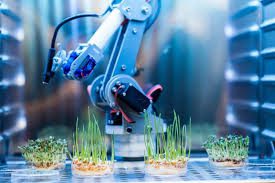Advantages of Biotechnology Application to Environmental Health
Advantages of biotechnology application to environmental health may be considered from the standpoint of the different advances that have been made in the different sectors described below:
Benefits of Biotechnology Application to Health and Healthcare Delivery
Medical biotechnology has benefitted more than 350 million patients around the world through the use of genetically -modified medicines to treat and prevent every day and chronic illnesses including heart attack, stroke, multiple sclerosis, breast cancer, cystic fibrosis, leukaemia, diabetes, hepatitis and other rare or infectious diseases.
It enables the development of therapies for rare diseases that are often debilitating and life-threatening and that affect millions of people around the world. Medical biotechnology is estimated to account for more than 20% of all marketed medicines and it is estimated that by 2015, 50% of all medicines will come from biotech.
Healthcare biotech increases the effectiveness and safety of treatments as well as reducing the use of ineffective treatments and adverse reactions through its approach on Personalised Medicine that works to diagnose what one patient’s problems are precisely and then work to better adapt the healthcare deliveries to suit individual and specific needs.
Healthcare biotech comprises more than 1700 companies and a market worth billions of dollars. It is therefore an important economic sector. It creates jobs for several skills in all departments of companies involved.
Medical biotechnology has offered new, cheaper, sensitive and better diagnostic test kits for rare and devastating diseases such as HIV, diabetes, heart diseases etc. It has also offered new opportunities for the development of far more effective vaccines against several childhood and adult diseases.
Most importantly, biotechnology offers the potential to increase the effectiveness of genetic selection, even for traits that are difficult or take a long time to measure. This makes it possible to identify individual animals for breeding, and select offspring, with the best overall combination of gene variants (alleles) rather than focusing on just one or two traits.

Biotechnology has unraveled the whole genomes helping unravel the genetic components of many multi-gene diseases in both humans and animals. This is made possible by our understanding of the genome sequences and the single nucleotide polymorphism (SNP) and the single point variations between the DNA of individuals of a species that determine traits.
Due to a clearer understanding of the existence of different versions of some genes, called alleles, and how these variants in some cases arise in an individual through mutations in a single nucleotide, it is now possible to pinpoint mutations across the whole genome quickly and study how the associated genes interact. Such information is used to investigate disease in animal and human species.
One of the most exciting discoveries of in biotechnology in recent years is the fact that rods and cones are not the only light receptors in the eye, overturning the long established view.
Read Also : Merits and Demerits of Biotechnology
There is also a receptor, called phototropin that recognises blue light at much lower levels, even operating in some people who are otherwise blind, playing an important role in setting the circadian clock.
Genes determine individual traits not just through their variations, or alleles, but also through differing levels of expression. Biotechnology is also leading the way in our understanding of how genes work.
It is unraveling the important role of microRNAs in controlling gene expression. RNAs are normally the intermediate molecules between DNA and their products, proteins, in gene expression.
It is now known that micro RNA is a type of RNA that instead of being involved in protein production, feeds back into the DNA coding process to regulate the expression of other genes. This raises an opportunity to further predetermine gene expression by controlling mutations in the genes coding for the microRNA itself.



